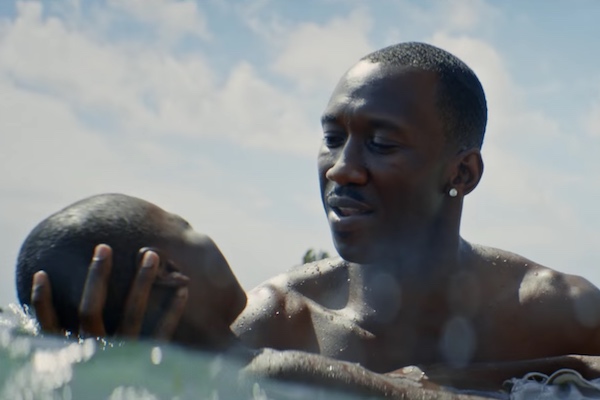Preview of the second week of the Chicago International Film Festival, 10/21/16 to 10/27/16 (Two Trains Runnin', Thunder Road, Fire at Sea, The Handmaiden, Being 17, Moonlight)
 Scott Pfeiffer
Scott Pfeiffer  Thursday, October 20, 2016 at 07:07PM
Thursday, October 20, 2016 at 07:07PM 
After sampling some of the fare on offer at the moveable feast that is the second week of the 52nd Chicago Film Festival, I would point you toward the following.
While it plies in an overly-familiar documentary register, Sam Pollard's Two Trains Runnin', playing Friday, October 21 at 8:00 p.m. and Saturday, October 22 at 11:45 a.m., is nonetheless a rousing, revelatory film about the "two trains" of the early 60s, the music and the movement--that is, the blues and Civil Rights. Running on not-quite parallel tracks, they converged in the heady summer of '64. Unbeknownst to each other, two groups of white kids who loved 30s country blues headed South on quixotic quests to find their heroes (Son House on the one hand, Skip James on the other). They ran smack into Freedom Summer, which, as this living history lesson reminds us, was the campaign in which white college students from California and New York were to spend the summer in Mississippi campaigning for voting rights for African-Americans, among other things. Not surprisingly, the Klan and the cops did not distinguish between the blues fans and the Civil Rights kids. In a head-smacking coincidence, Freedom Summer campaigners James Chaney, Andrew Goodman and Michael Schwermer disappeared on June 21, 1964, the very same day Son House and Skip James were found. Now recognized as immortal giants, these men were plucked from obscurity late in life by these young white fans and placed before the spotlight of the Newport Folk Festival of '64. Those "nerdy" blues lovers, now seniors, tell memorable stories about the dangers and pleasures of those days. I won't forget the story about the "blues house," where all the "rediscovered" blues legends playing Newport that summer stayed--a kind of blues heaven where you could go from room to room and hear a different hero playing in each. This timely film reminds us that there are forces at work even now fighting to roll back the gains in society that, in the summer of '64, brave young people died for.
Thunder Road is a funny, unsettling short about the pain of mourning, playing in the Shorts 4: They Can't Go Home Again program on Saturday, October 22 at 7:00 p.m. It is a 12-minute, one-shot, essentially one-man film, featuring a remarkable tragicomic performance by the director, Jim Cummings, playing a heartbroken, damaged cop who sings Bruce Springsteen's immortal Thunder Road at his mother's funeral. It was her favorite song. He put me in mind of the kind of essentially good-hearted losers Ricky Gervais plays so well. You might think it sounds like a tearjerker, and I admit it got a bit dusty as I watched. But the film keeps you off-balance: you never know quite whether to laugh or cry. The young man's rambling remarks as he tries to reckon with his mother's short life are digressive but guileless, and somehow everything he's trying to say about her can be summed up in her love for Springsteen. His furious rendition of the song, at once gutsy and increasingly grotesque, features some very funny dance moves. Simultaneously a work of cringe-comedy and a portrait of anguish, the film is a concise character study, as well. So much flits across Cummings' mortified visage: grief, nerve, regret, triumph, shame, defiance.
Not to be missed is Gianfranco Rosi's unique documentary Fire at Sea, playing Saturday, October 22 at 7:30 p.m. and Tuesday, October 25 at 6:15 p.m., a great work of humanism and a storehouse of powerful imagery. (It won the top prize at the Berlin Film Festival, and it's the Italian submission for the foreign-language Academy Award.) The setting is Lampedusa, an ancient, tiny Italian fishing island, which for years has been the gateway to Europe for hundreds of thousands of migrants from Nigeria, the Ivory Coast, Syria, and points beyond. There is no narration or editorializing, but the situation is ripped straight from the headlines: souls crossing the sea on small, rickety, overstuffed boats, looking for freedom, knowing they'll die if they stay at home. Some 15,000 have died trying to make it. We follow the Coast Guard on rescue ops. They drag the sickest migrants off the boat, more dead than alive. Then, there is horrifying footage from the hold underneath: cadavers strewn with trash. Rosi secures rare footage from inside the immigrant holding center. At night, these largely North African men, who often turn up on the island burned with diesel fuel, look like gilded silhouettes in their gold-foil reflector ponchos. We meet a haunted, compassionate doctor tasked with examining the migrants after their sea voyage. Often, he must handle dead children. ("It is the duty of every human being," he says, "to help these people.") We also follow a young island boy with a lazy eye and no particular aptitude for being a sailor, the historic role for every Lampedusa boy. He might as well be on a different planet than the migrants. For great stretches there is no dialogue or music, and all of our information comes from Rosi's poetic visuals. I think of the deep quiet at the bottom of the sea as we follow a deep-sea fisherman, or the still of the early morning as a rescue chopper is wheeled out on the Coast Guard carrier's hangar. We occasionally visit the studio of the island's DJ, then cut to the boy's grandparents as they happily listen to the radio, the grandma serving the grandpa tea. As I watched the old lady make her bed, I mused over an old photograph on her nightstand. Suddenly, she picked it up, kissed it and spoke to it. It's a small moment, but it's indicative of this film's great, quiet heart.
Chan Wook-Park's exuberantly naughty, heavy-breathing (dare I say feminist?) The Handmaiden, playing on Sunday, October 23 at 8:15 p.m. and Tuesday, October 25 at 8:30 p.m., makes your pulse race. It's an erotic revenge-drama/period romance. [It would be easy to spoil this picture, so I've tried not to spill too much here. By rumor and reputation, you may already know about the theme of giddy sexual discovery.] Three devious characters swindle each other in a sumptuous mansion in Japanese-occupied Korea. Kim Tae-ri poses as a Korean handmaiden to the Japanese Lady Hideko, played by Min-hee Kim. Actually, the handmaiden is part of a plot to get her hands on the lady's "assests." Min-hee Kim played such an everyday woman in Hong Sang-Soo's Right Now, Wrong Then; it's a treat to see her play Lady Hideko, who's about as far from that as can be. There's always a secret flitting about those eyes, that smile. Jung-woo Ha is a suave professional con man posing as a Count; also in pursuit of the fortune, he believes himself to be playing the ladies off against each other. The movie's got double-crosses, triple-crosses and a perverse uncle. In the sanctum of his cherished library of rare dirty books, this debauchee makes his niece--Lady Hideko--read scandalous stories and perform certain feats for audiences of sado-masochistic men. It's more Fanny Hill or The Pearl than it is Salo. From Chan Wook-Park we expect, and get, gorgeous cinema. Told in three parts, the intricate narrative is a marvel of construction. After extended coyness, exquisitely tense, it builds to quite a release of grinding, explicit lovin', but these scenes somehow feel celebratory rather than exploitative. The rest of the world drops away. I won't forget those jingle bells on a rope! The Handmaiden's wicked spirit is infectious.
I thought very highly of André Téchiné's Being 17, which plays Sunday, October 23 at 3:15 p.m. and Monday, October 24 at 8:30 p.m. Finally, the single best film I saw in the course of my festival survey was Barry Jenkins' Moonlight. It plays Wednesday, October 26 at 7:30 p.m. I wrote about them both for CINE-FILE Chicago, and you may read my capsule reviews here.



Reader Comments